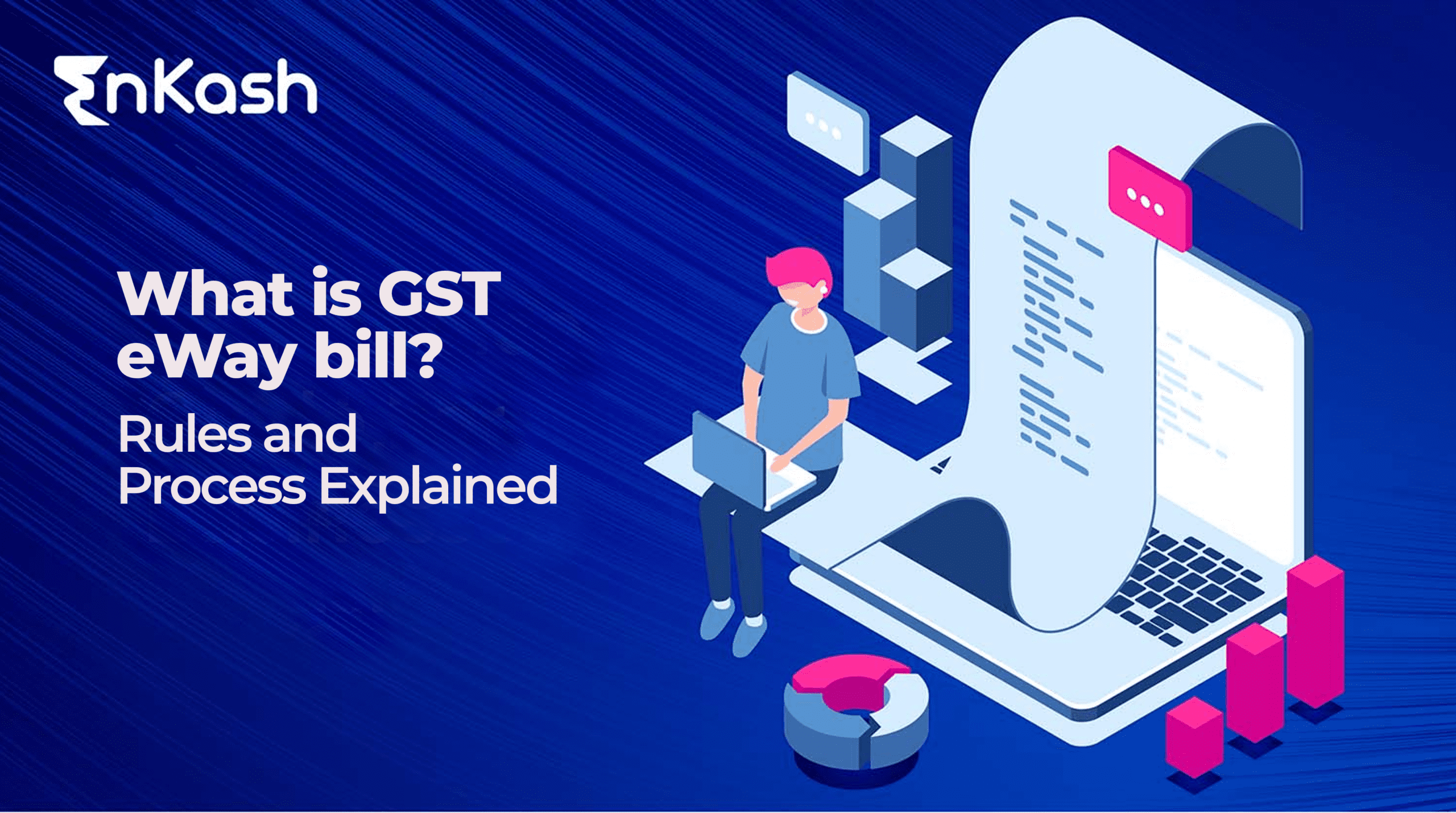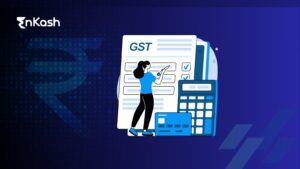The E-Way Bill is an electronic document required under the Goods and Services Tax (GST) system for the movement of goods across India. It serves as a digital proof that a consignment is being transported in compliance with GST regulations. Introduced to streamline logistics and curb tax evasion, the e-way bill has made goods movement more transparent and efficient.
Under GST, generating an e-way bill is mandatory for consignments valued at ₹50,000 or more, whether for supply, return, or inward purchases. According to the official e-Way Bill System Portal, over 10 crore e-way bills are generated every month, highlighting its significance in India’s supply chain ecosystem.
This guide will help you understand what an e-way bill is, when it is required, how to generate it, and the rules you must follow to stay compliant.
What is a GST eWay bill?
An E-Way Bill (Electronic Way Bill) is a digital document required under the Goods and Services Tax (GST) regime for the movement of goods from one place to another. It serves as an authorization for transporting consignments and ensures that goods are being moved in compliance with GST rules.
The full form of E-Way Bill is Electronic Way Bill. It was introduced under Section 68 of the CGST Act and Rule 138 of the CGST Rules, 2017, to replace the earlier physical waybill system used under VAT.
An e-way bill is mandatory for consignments valued at ₹50,000 or more for inter-state movement. For intra-state movement, thresholds vary by state.
Also Read: Credit Note in GST
When should an eWay bill be generated?
As mentioned above, the GST eWay bill is issued for goods exceeding the limit of Rs. 50,000. However, there are other specific situations listed below that lead to the issuance of an eWay bill, dependent on the difference between CGST, SGST, and IGST
- Supply of goods (regular sales)
- Non-supply transactions such as job work, branch transfers, or exhibitions
- Purchases from unregistered persons
- Return of goods or inward supply
In the case of interstate movement of handicraft goods or goods sent for job work, an e-way bill is mandatory even if the value is below ₹50,000.
Note: The bill should be generated before dispatch, either by the supplier, recipient, or transporter.
Who should generate the GST eWay bill?
The Goods and Services Tax eWay bill is initiated by different parties involved in the transportation of goods. The responsibility for generating the GST eWay bill can vary based on the circumstances of the supply or movement of goods and may include:
1. Registered Supplier
If you are a GST-registered supplier, you are responsible for generating the e-way bill whenever you supply goods that meet the value threshold. This applies to both B2B (Business-to-Business) and B2C (Business-to-Customer) transactions.
2. Registered Recipient
If the supplier does not generate the e-way bill, the recipient of goods (buyer) must generate it before taking delivery, provided they are GST-registered.
3. Transporter
In cases where neither the supplier nor the recipient generates the bill, the transporter moving the goods (by road, rail, air, or vessel) must create the e-way bill based on the invoice, challan, or bill of supply.
4. Unregistered Person
Even if you are not registered under GST, you are required to generate an e-way bill if you move goods worth ₹50,000 or more. If the unregistered person is supplying goods to a registered buyer, the responsibility may shift to the buyer.
How to generate an eWay bill on the portal?
Follow the steps mentioned below required for the generate of the eWay bill on the portal:
Step 1: Prepare the Required Details
Before you start, keep the following information ready:
- Valid GSTIN of the supplier and recipient
- Invoice, Bill of Supply, or Delivery Challan
- Transporter ID or Vehicle Number (if applicable)
- Consignment details: value, HSN code, quantity, place of delivery
Step 2: Log in to the E-Way Bill Portal
- Visit ewaybillgst.gov.in.
- Enter your username, password, and captcha to access your account.
- Go to ‘Generate New’ under the E-Waybill option in the menu.
Step 3: Fill in Part A (Consignment Details)
- Enter transaction type (outward/inward)
- Select document type (Invoice, Bill, Challan)
- Enter document number and date
- Fill in the GSTIN details of the supplier and the recipient
- Provide HSN code, consignment value, and place of delivery
Step 4: Fill in Part B (Transport Details)
- Enter vehicle number if goods are transported by road
- If using a transporter, provide Transporter ID and Document Number
- For rail, air, or ship, provide Transport Document Number & Date
Step 5: Generate and Verify the E-Way Bill
- Click ‘Submit’ to generate the e-way bill
- The system will display a 12-digit E-Way Bill Number (EBN)
- Download and share the EBN with the transporter and recipient
- Keep a soft copy or printed copy during transit
Alternative Generation Methods
If you prefer a quicker process, you can also:
- Use the E-Way Bill Mobile App for on-the-go generation
- Send an SMS in the prescribed format for quick generation
- Use the Bulk Generation Tool to generate multiple e-way bills at once.
When the GST eWay bill is not required
An E-Way Bill is not required in the following cases:
- Exempted Goods: Fully GST-exempt items like certain agricultural products or essential commodities.
- Intra-State Transport Below Threshold: Goods moved within the same state valued below ₹50,000.
- Non-Motorized Transport: Goods moved via hand carts, bicycles, bullock carts, etc.
- Specific Transactions:
- Goods returned to the supplier under warranty or replacement
- Goods for personal use, not business purposes
- Goods moved under customs supervision or for government use
Disclaimer: The tax laws and regulations are subject to change, and the exemption criteria keep changing from time to time.
Validity of the E-way bill in GST
Type of Goods / Transport |
Distance Slab |
Validity |
Notes / Extensions Allowed? |
|---|---|---|---|
Normal goods (non-ODC) |
Up to 200 km |
1 day |
Yes — can extend (before expiry or within 8 hours after). |
Normal goods (non-ODC) |
> 200 km (for each additional 200 km or part thereof) |
+1 day per 200 km (or part) |
As above (extensions allowed as per slab logic). |
Over-dimensional cargo (ODC) |
Up to 20 km |
1 day |
Yes — extension possible (same logic as slabs). |
Over-dimensional cargo (ODC) |
> 20 km (each additional 20 km or part) |
+1 day per 20 km (or part) |
As above (extensions allowed as per slab logic). |
Maximum cap (original + extensions) |
— |
360 days from generation |
Cannot extend beyond 360 days total. |
Document date allowable for e-way bill generation |
— |
Up to 180 days old |
Documents older than 180 days from the date of generation are not eligible for e-way bill generation. |
Extension window |
— |
Within 8 hours before expiry or 8 hours after expiry |
Subject to conditions and not exceeding the 360-day cap. |
Extension when goods not moved |
— |
Not allowed |
Must cancel/regenerate if within permissible window. |
What are the contents of an eWay bill?
Below are the key components of the GST eWay bill:
- Electronic document: The eWay bill is generated via GST portal electronically or through a mobile app. It contains all the relevant details of the goods being transported, the consignor, the consignee, the transporter, and the vehicle used for transportation
- Mandatory for certain transactions: E-way bills are mandatory for the movement of goods worth more than a specified value (i.e. Rs. 50,000), which may vary from state to state. This value is set at a certain threshold, and if the value of the goods exceeds this threshold, an eWay bill must be generated
- Interstate and intrastate movement: E-way bill GST is required for both interstate and intrastate movements of goods. Even if goods are being transported within the same state, an eWay bill may be necessary if the value of the goods exceeds the specified threshold
- Validity period: An eWay bill is valid for a specific period, which depends on the distance the goods are expected to travel
Enforcement and penalties: Authorities can inspect vehicles and verify eWay bills during transit. Failure to produce a valid eWay bill can result in penalties and the seizure of goods - Generation and updation: The eWay bill can be generated by the supplier, recipient, or transporter of the goods. The person responsible for generating the eWay bill must update the information on the GST portal as the goods move from one place to another, providing real-time tracking
- Exemptions: Some categories of goods and certain situations are exempt from the requirement of eWay bills, and these exemptions may vary by state and time. For a comprehensive list of GST exemptions, please refer to the official GST website.
State-wise E-Way Bill Rules & Thresholds (2025)
State / UT |
Intra-State Threshold (₹) |
Inter-State Threshold (₹) |
Special Notes / Exemptions |
|---|---|---|---|
Andhra Pradesh |
50,000 |
50,000 |
Standard threshold |
Arunachal Pradesh |
50,000 |
50,000 |
— |
Assam |
50,000 |
50,000 |
— |
Bihar |
1,00,000 |
50,000 |
Higher intra limit |
Chhattisgarh |
50,000 (for specified goods) |
50,000 |
Other goods exempt |
Delhi |
1,00,000 |
50,000 |
Intra-threshold higher |
Goa |
50,000 (only for 22 goods) |
50,000 |
Limited goods list |
Gujarat |
50,000 |
50,000 |
Yarn/fabric/garments exempt intra; no e-way for inter-city |
Haryana |
50,000 |
50,000 |
— |
Himachal Pradesh |
50,000 |
50,000 |
— |
Jammu & Kashmir (UT) |
No e-way bill intra |
50,000 |
Only interstate needed |
Jharkhand |
1,00,000 |
50,000 |
Applies for most goods |
Karnataka |
50,000 |
50,000 |
— |
Kerala |
No general intra requirement (only Gold intra from Jan 2025) |
50,000 |
Recent update |
Madhya Pradesh |
1,00,000 |
50,000 |
— |
Maharashtra |
1,00,000 |
50,000 |
Some exemptions intra |
Manipur |
50,000 |
50,000 |
— |
Meghalaya |
50,000 |
50,000 |
— |
Mizoram |
50,000 |
50,000 |
— |
Nagaland |
50,000 |
50,000 |
— |
Odisha |
50,000 |
50,000 |
— |
Puducherry (UT) |
50,000 |
50,000 |
— |
Punjab |
1,00,000 |
50,000 |
Higher intra limit |
Rajasthan |
1,00,000 (outside city) / 2,00,000 (within city) |
50,000 |
Excluding tobacco, wood, steel |
Sikkim |
50,000 |
50,000 |
— |
Tamil Nadu |
50,000 |
50,000 |
— |
Telangana |
50,000 |
50,000 |
— |
Tripura |
50,000 |
50,000 |
— |
Uttarakhand |
50,000 |
50,000 |
— |
Uttar Pradesh |
50,000 |
50,000 |
— |
West Bengal |
50,000 (revised from 1,00,000) |
50,000 |
Reduced the intra-threshold in Dec 2023 |
Documents and details required to generate the GST eWay bill
For the generation of GST eWay bills in India, the following documents and details are required. If you don’t know your GSTIN, you can search GST number online.
- Invoice or bill of supply: You need the invoice or bill of supply related to the movement of goods
- Transporter ID: If the transportation is done by a registered transporter, you’ll need their GSTIN (Goods and Services Tax Identification Number)
- Vehicle number: Details of the vehicle used for transportation, including the vehicle number
- Goods description: A clear description of the goods being transported, including their HSN (Harmonized System of Nomenclature) or SAC (Services Accounting Code) code
- Value of goods: The total value of the goods being transported
- Place of supply: The location where the goods are being shipped to
- Reason for transportation: You may need to specify the reason for transporting the goods, such as supply, export, import, job work, etc
- GSTIN of the recipient: The GSTIN of the recipient (if applicable)
- Transporter document number: If the transporter is not a registered GST taxpayer, you’ll need the transporter document number (such as the Lorry Receipt or Road Way Bill)
- Part-B details: For a consolidated eWay bill, you might need Part-B details, including vehicle number, transporter ID, and document number
Note: Keep in mind that the specific requirements and the process for generating an eWay bill may vary from state to state in India.
Also Read: Types of GST Returns
What are the penalties associated with the GST eWay bill?
Moving goods without an invoice and an e-way bill constitutes an offense. A penalty of ₹10,000 or the tax evaded (whichever is higher) applies. As a result, the bare minimum penalty that is levied for not complying with the rules is Rs. 10,000
FAQ’s:
1. Can I add two invoices in one eWay bill?
You cannot use one e-way bill for multiple invoices. Each invoice or consignment requires a separate e-way bill. As mentioned above, an eWay bill is a document that is required to be generated for the movement of goods for more than Rs. 50,000 within the country and is mandated to be generated for each and every unique invoice/shipment. It is to be noted that each invoice/shipment requires a separate e-way bill comprising its own unique number.
2. Are eWay bills required when the goods are billed within 10 km?
Under the Goods and Services Tax (GST) regulations in India, eWay bills are generally required for the movement of goods when the distance exceeds 10 kilometers, except in a few specific cases. If the distance for the movement of goods is less than or equal to 10 kilometers, there is usually no requirement to generate an eWay bill.
3. How are the criteria of “Value of Consignment of Goods” applied?
It is based on the value declared in the invoice, bill of supply, or delivery challan, as the case may be, issued in respect of the said consignment and also includes central tax, state or union territory tax, integrated tax and cess charged, if any. However, it will not include the value of the exempt supply of goods, where the invoice is issued in respect of both exempt and taxable supply. It will also not include the value of freight charges for the movement charged by the transporter.
4. Can the validity of GST eWay bill be extended?
Yes, the validity of the eWay bill can be extended in case the consignment cannot reach the destination within the validity period due to exceptional circumstances such as issues relating to law & order, natural calamity, delay in shipment, conveyance accident, or more. Moreover, an explanation has to be given by the transporter during the extension of the validity period of an eWay bill.
5. How to Cancel an E-Way Bill?
An E-Way Bill can be cancelled if the goods are not transported, or if the details entered are incorrect. The cancellation ensures that no compliance issues arise later.
Steps to Cancel an E-Way Bill
- Log in to the E-Way Bill Portal.
- Go to E-Waybill → Cancel from the dashboard menu.
- Enter the 12-digit E-Way Bill number (EBN).
- Click Go, and the system will fetch the bill details.
- Select Cancel and provide the reason (e.g., goods not moved, error in details, duplicate entry).
- Confirm the cancellation.
6. How to Check E-Way Bill History?
You can easily view the history of all e-way bills generated, rejected, or cancelled through the GST E-Way Bill portal. This helps businesses track consignments and maintain compliance records.
Steps to Check E-Way Bill History
- Log in to the E-Way Bill Portal.
- On the dashboard, go to Reports → My E-Way Bill → Generate Reports.
- Choose the report type you want to see:
- Generated by me
- Generated for me
- Rejected by me
- Cancelled by me
- Select the date range or specific E-Way Bill Number (EBN).
- Click Submit to view the history.












